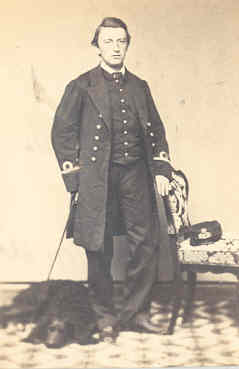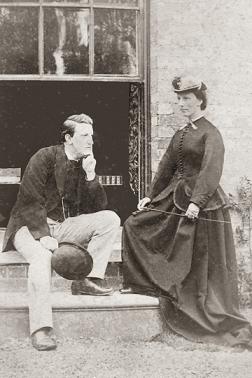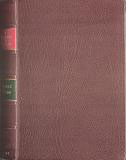Dated:
January 1860
The
few letters that have survied from the time he served in the Navy make interesting
reading. On 12th December 1852, for example, whilst serving on the Leopard
he writes: We have just returned from Balaclava.... many ships wrecked
outside of Balaclava...we went on shore to visit soldiers’ camp... the
conditions were very poor... there is a talk of Lord Raglan being recalled...
he is not thought very highly of out here, though the engagements we have
had have been successful, but it has been more through hard fighting than
good management.......
All his
siblings were fond of him, his sister Isabel in particular. In a letter to
an unnamed sister she writes: Augustus brought home some nice curiosities
that he grappled from the fort of Bomersund... some Russian bullets and grape
shot and part of a shell, and a sort of alter cloth that he took out of the
chapel in the fort, and he said the chapel had a quantity of guilding about
it which they took and stuck about their berth and made it look quite grand....
but the French got in first and got all the best things so that there was
not much left for them......
Edith chides
him in a letter written in 1857 for not writing more frequently to his father
like his brothers Edgar and Eustace did. Their mother had died and Philip
was feeling a little lonely and felt his eldest son was ignoring him.
He was
frustrated at not receiving promotion in the Navy more rapidly and did not
believe his naval career held many prospects for him. He had for some time
been contemplating emigrating to America. Isabel his sister writing to her
brother Edgar on 22nd January 1873: August seems to be thinking of leaving
the navy and emigrating. I suppose he sees no chance of promotion and is tired
of waiting and is tired of the Navy. Edda says he goes around the house singing
'Maryland, my Maryland'..... and 'Carry me back to Old Virginny'...An official
document has informed him that there would be no more appointments to the
Naval College and that has decided his course.
Writing
on 27th March 1873 she says: I suppose you have heard about August setting
sail on the 17th in the Elbe with the Charlie Sumners, his wife and children.
He went off in great spirits I hear. He considers himself quite engaged to
Miss Owen and I hear at the last that perhaps she would go out to him. They
seem very devoted to each other. The Sumners were relatives of Bishop
Sumner of Winchester, the Bishop being an old friend of Augustus's father.
His engagement, if that is what it was, to Miss Owen was not to last. In a
letter of 23rd July 1873 Isabel writes:.....I hear he is very sad as Mary
Owen has given him up... I feel rather cross with her for I think she should
have told him so that she could not marry him... there are some very nice
ladies now lodging in the next house.....His relationship with Mary Owen
takes up much time in the correspondence.
He would
appear to be enjoying his time in California however. A number of letters
from there have survived. Isabel states: August has sent home a capital
plan of the Laguna ranch and an account of it. There are two houses. The Summers
live in one and August has the other (the adobe) to himself going to the Summers
for meals, a capital arrangement. The nearest town Temecula is 20 miles off,
San Bernadino 40 miles, Los Angeles 70 miles and San Diego 100 miles. A neighbouring
ranch is for sale...Santa Rosa, and some nice Americans had been to see it
staying the night at the Summers and they hoped would buy it..... if so they
will have some nice neighbours 13 miles off. Two other ranches on either side
of them are owned by men of Spanish origin, Juan Machado and messrs Gonzales
and Murietta.....
The ranch
were he was working, apart from farming sheep, delivered stores to gold miners
working in the camps in the vicinity. Writing to his sister Edith on 26th
May 1874 from Laguna he states: We
have heard that the desperado Vasquez has been taken at last, he was getting
rather too near our quarters to be pleasant to some. Mrs P was beginning to
get into a state of mind, though there was no fear of him paying our little
settlement a visit as we are too many and on a high road with mostly travellers
camping all around us ... next week or shortly I shall have to go to Los Angeles
for a number of stores, one being a big boiler for our sheep, not to boil
them down, but only par-boil them in tobacco, since its the best cure for
scab, which is rather bad among the sheep just now. The Indians we employ
here are such capital hands at work but its hard to keep them away long from
home without their squaw. I must tell you a yarn about one on the next ranch.
When asked by Mr Gonzalez why he did not sleep near his work but went home
every night, he replied that if he did not go home his wife and family (of
eleven) would have no blanket to sleep under, the said blanket being worn
by himself.... the best of the joke being that the blanket was very old and
holy and one would fancy being hardly enough to cover one. The wages out here
for labour are very high. Cutting hay or corn one dollar a day, with food,
sheep herding 25 and food. I wonder more white men don’t come down here.
But things
were not going too well in California. Before he had left for America, it
transpired he had taken to drinking overly, and would appear to have continued
doing so. Perhaps this had something to do with his failed relationship with
Mary Owen, we shall never know. He was drinking spirits, something that did
not go down well with the Sumners, who were ultimately his employers. He gave
his account of matters in a letter written to his sister Gertrude on 12th
November 1875, which she in turn copied out for her sister Edith. She had
already had a letter from Georgie Sumner, Charlie Sumner's wife. He was
unconscious due to drink but defends himself in three particulars. "1.
On board Mrs Sumner knows as well as I do that the spirits were drugged or
purpose to make me drunk. 2. I was never intoxicated at San Francisco. 3 I
never gave a solemn oath I would not drink if she promised to write home.
I said I would not touch spirits for 6 months if she would say no more about
it and she kept her promise by telling a new herder within 3 days that I was
in the habit of getting tipsy." This might easily be a misunderstanding
on both sides and Mrs Sumner is a pretty excitable young lady quite likely
to exagerate. But I was glad August ended "The facts are bad enough without
trying to make them worse. However, I have told her I was sorry and she said
she forgave me so I hope this black page in my history is over and with God's
help it shall be." There is something grand in the simplicity of that
boy's few words when he is deeply moved. The trial will be when his six month
pledge is over.
We learn
from a letter dated 21st November 1873 that he was back in Crawley. Edith
his sister writes to their brother Edgar: Poor Aug is waiting day by day
with nothing to do while the Admiralty, or rather communication office, take
their time. He is learning Spanish with a Prof Keane at Southampton, but he
has left his gun in California - where he has just heard it has been stolen
and his riding gear is there too, so that there seems really nothing to do.
He sometimes meets MO but it is all a chance and no letters go on. The time
is therefore very trying as his almost daily companion Jack Utterton is too
much in the region of spirits to be at all good for him. I want you to remember
him very especially in your prayers. He has been in a very anxious way for
months taking large quantities of spirits & wine I hear - and now I think
he is trying to give up and the depression and misery is great. My one terror
is that father should have any idea about it, for I fear he is talked of in
the town very much. If Pater were not as blind as 1000 batts he must have
seen it. There has been great excuse in all the wrong he has had poor lad
and from my heart I pity him and honour his struggles which I hope may be
succesful in the end.
He returned
to California and in 1884 we find him working at the Tejon Ranch, in Bakersfield,
California. This was founded in the 1840s and is one of the oldest working
ranches in the state, and has become somewhat of a Californian institution.
He wrote
a charming little book which was privately published titled 'California'.
Many of his comments were very much ahead of their time. To read this, please
click on the book icon below.
Sources:


.jpg)
